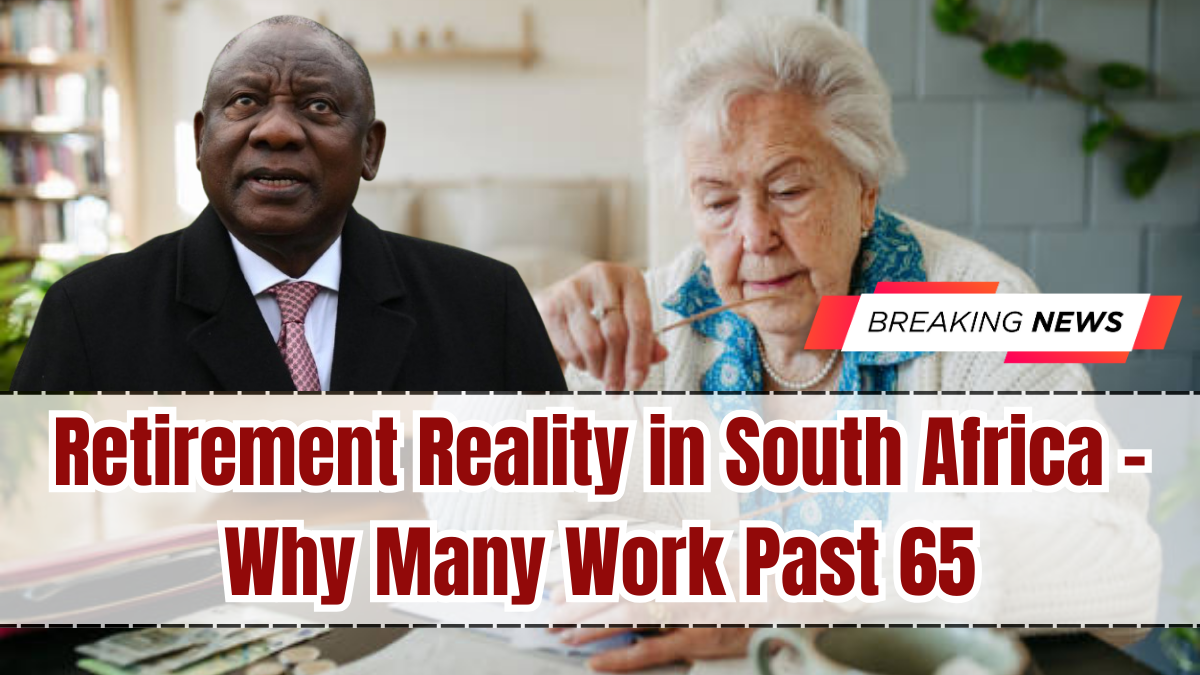Retirement is often seen as the time to rest, relax, and enjoy the rewards of a lifetime of hard work. In South Africa, however, the reality looks very different for many. Even though the official retirement age remains 65, a growing number of South Africans are continuing to work well into their late 60s and 70s.
This trend is not simply about choice. For most, it is about necessity. Rising living costs, insufficient pension savings, and longer life expectancy mean that many people cannot afford to stop working at 65. Instead of slowing down, they are taking on part-time jobs, running small businesses, or even remaining in full-time employment to make ends meet.

Why Many South Africans Work Past 65
The biggest reason is financial insecurity. A large percentage of workers in South Africa do not have private pensions or significant retirement savings. The majority depend on the SASSA Old Age Grant, which pays around R2,220 per month, far below what is needed to live comfortably.
As a result, retirees often supplement their grant income with work. For some, this means casual jobs like gardening, cleaning, or shop assistance. For others, it may involve using their skills to consult, tutor, or freelance.
Another factor is rising healthcare costs. Medical expenses typically increase with age, and many seniors find their grant or pension is not enough to cover doctor visits, chronic medication, and hospital care. By working longer, they create an extra buffer for these costs.
Life Expectancy and Changing Expectations
Life expectancy in South Africa has improved over the past two decades. Today, many people live into their 70s and beyond. While this is positive, it also means retirement needs to last longer—often 20 to 25 years. Without adequate savings, stretching resources over such a long period becomes extremely difficult.
Culturally, expectations around retirement are also shifting. In some communities, older people continue to play active roles, both at home and in the workplace. Many grandparents also contribute financially to supporting extended families, including children and grandchildren.
The Role of Employers
Some companies in South Africa encourage workers to retire at 60 or 65, while others are flexible. For skilled professionals, such as teachers, doctors, and consultants, employers often allow contracts beyond 65 because their expertise remains valuable.
However, for lower-income workers in physically demanding jobs, continuing to work beyond 65 can be extremely tough. Without employer pensions, these individuals often have no choice but to keep working, even when their health begins to decline.
Challenges Facing Older Workers
Working past 65 comes with unique challenges. Age discrimination remains a concern, as employers may prefer younger workers. Physical health is another barrier—many jobs require stamina that older workers may no longer have.
Additionally, informal work taken up by retirees often pays poorly and lacks protections such as medical aid or workplace insurance. This can make older workers vulnerable, despite their willingness to remain active.
Government Support
The government provides support through the Old Age Grant, available from age 60, and increased slightly for those above 75. However, the amount is still below the upper-bound poverty line, meaning most seniors cannot rely on it alone.
There are ongoing debates about whether South Africa should move towards a Universal Basic Income Grant (UBIG) to provide more consistent support for all adults. While discussions continue, the reality for many seniors is to keep working.
Planning for Retirement
Financial experts stress the importance of planning early. Contributing to pension funds, retirement annuities, or savings accounts can help reduce reliance on grants later in life. Unfortunately, high unemployment and low wages mean this is not always possible for the majority.
For those nearing retirement, practical steps include:
-
Reviewing pension and provident fund balances.
-
Considering part-time work or business opportunities for post-retirement.
-
Prioritising healthcare planning through medical aid or savings.
-
Exploring government and community support schemes.
Why Retirement Age Debates Continue
Although the retirement age remains officially at 65, the reality is that many South Africans simply cannot afford to stop working then. For policymakers, this raises questions about whether the retirement system is sustainable and whether benefits should be increased.
At the same time, raising the retirement age officially could worsen unemployment among younger workers. The solution may not lie in changing the legal age, but rather in improving pensions and social support so that retiring at 65 is truly possible for more people.
FAQs
What is the official retirement age in South Africa?
It is 65 years, though many people choose or are forced to work beyond this age.
Why do many South Africans work past 65?
Because of low pensions, high living costs, and medical expenses, many seniors cannot afford to retire fully.
Can I retire earlier than 65?
Yes. Some companies allow early retirement at 60, and the Old Age Grant is available from age 60.
Does the Old Age Grant cover living costs?
No. At around R2,220 per month, it falls short of the poverty line, making extra income necessary.
Will the retirement age increase in the future?
There are no official plans, but discussions around pension reform continue. The focus is on strengthening financial support rather than raising the age.
Click here to know more.




